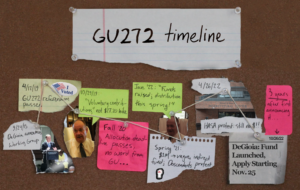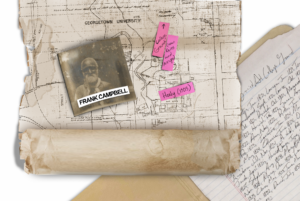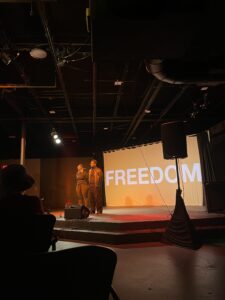With calls of “Reparations when? Reparations now!” and “Turn up, don’t turn down, take responsibility, Georgetown!” students revived the effort to hold the university accountable for its commitment to descendants of the 314 enslaved people Georgetown owned and sold in 1838.
Approximately 20 students tabled in front of White-Gravenor Hall with posters and a petition, building on a teach-in Hoyas Advocating for Slavery Accountability (HASA) held on Tuesday, April 26.
HASA is spearheaded by Julia Thomas (COL ’23), a GU272 descendant. Thomas and many of her activist and descendant peers expressed disappointment and frustration with the university’s stagnating progress on the GU272 referendum held in 2019. They believe the university has not done enough to bring true justice and reparations to descendants.
HASA is a continuation of Students for GU272, which has been renamed to recognize that Georgetown owned more than just the 272 people sold in 1838. The organization also aims to join student and descendant voices in common cause by connecting student advocacy efforts on campus to descendant voices and needs, while letting descendant voices take the lead.
The primary university mechanism for addressing its racist history, the Descendants Truth and Reconciliation Foundation, has deep flaws, according to Thomas. She took particular issue with the foundation’s board structure, which gives students, not descendants, ultimate say over where the money is invested.
“Students shouldn’t have the power to decide who’s getting reparative justice and who’s not. I feel like fundamentally the way that the board is structured is very flawed,” Thomas said. “A lot of the descendants feel this board is harmful and insulting because they’re not included in the process of how they’re going to get this reparative justice.”
Chase Chester (COL ’22), another descendant on campus, feels as though the university’s current model of providing reparations doesn’t take into account what the descendant community is actually asking for.
“Throwing out these things we didn’t ask for is a disservice to my community because it’s a PR stunt, it’s marketable,” Chester said.
Furthermore, the foundation’s money is invested with JPMorgan Chase, which profited off the 1838 sale by using the GU272 as collateral. Thomas also believes that the university needs to take steps beyond the board to commemorate the lives of the enslaved people on which campus is built and wants their contribution to be commemorated.
“There’s a lot of things as students we’re hoping to push for, a memorial on campus, more descendant-led projects, and just more of a voice for the descendants,” Thomas said. “We want to have something annually where we can honor and fundraise for the descendants.”
Olivia Henry (COL ’24),a key organizer in HASA, shared their excitement about the future and pride in the work HASA has already done, including yesterday’s teach-in. Henry said the event was well-attended and succeeded in creating powerful dialogue and ideas.
“Creating a community and safe space for people and making sure people feel heard, and that’s what last night felt like. That’s what today felt like,” she said.
They are particularly excited about the ability for descendants to connect with one another and that HASA is centering descendant voices.
“We haven’t been organizing in the past, so there hasn’t been a space for descendants to connect and advocate for themselves,” Henry said.






